- Home
- Rae Carson
The King's Guard Page 4
The King's Guard Read online
Page 4
The archer and the bully step forward.
“The two of you go pack. His Majesty requires you to run an errand for him with Hector.”
“That’s not right,” I blurt. “It’s supposed to be Tomás and Marlo!”
Tomás and Marlo exchange an alarmed glance.
I reach for the note and stop just short of snatching it from Enrico’s hand.
He holds it up in a way that’s almost taunting. “His Majesty says I’m to send two other recruits. In my judgment, Fernando and Lucio are best qualified to aid you.”
I’m fuming, and it must show, because a subtle smile plays across Enrico’s lips. He’s taking advantage of the opportunity to get rid of three of us at once. I don’t care about Lucio—he’s only getting what’s coming to him—but Fernando doesn’t deserve this. His only fault is not knowing anyone to whom Enrico owes a favor. I don’t deserve this either.
“Do you have a problem with my commands?” Enrico asks.
“No, my lord!” I answer.
“Good,” he says. “Mandrano, escort these whelps to their quarters so they can gather their things.”
“My lord . . .” I say, and then hesitate.
Enrico watches me like a hangman doling out rope to his victim. “Yes, princess?”
“It should only take a few days to get there and back. We’ll return to our training immediately after.”
Enrico smiles. “There is no mention here of how long this . . . errand will take. We can’t assume you’ll return before the evaluation is complete. It’s possible you’ll miss so much training that you won’t be able to catch up with everyone. We’ll have to decide what to do with you when you return. Understood?”
My heart sinks. “By my king’s command, my lord,” I say.
“Fernando! Lucio!” Enrico snaps. “Clear the barracks of all your things now.”
As they rush to comply, I realize assassins along the highway are now the least of my worries. Based on the looks Fernando and Lucio are throwing over their shoulders at me, they’ll team up to murder me themselves.
“You too, princess,” Mandrano says, though the barb seems halfhearted. He’s looking up at Enrico, a puzzled expression on his face. “Go get that pretty dress off your cot and pack up.”
8
THE walk to the stables is fraught with silent, seething anger. “What in seven hells is going on?” Lucio rages as soon as we are out of earshot.
“I’ve told you everything I can,” I say. “The king is sending us as couriers to Puerto Verde. We’ll come back as soon as we’re done.”
“I don’t care if you’re kissing camels to get the favors you get,” he says. “But if you muck up my one chance to get into the Guard—”
“You think this is a favor?” I fume. “You think I asked for this?”
“If it gets you out of training with—”
“Calm down,” Fernando says. “We’re doing something for the king. That’s why we want to be in the Guard, right, so we can do things for the king?”
He addresses Lucio, but his eyes are on me.
“You heard Enrico,” Lucio says. “He’s going to throw us out like so much trash when we get back.”
“But it’s King Alejandro’s Guard, right?” Fernando says, his eyes still fixed on me. He’s trying to parse his own chances.
“So I’ve heard,” I say.
“It’s the king’s Royal Guard,” Lucio says. “Not Alejandro’s. It was his father’s before, and it’ll belong to whomever comes after.”
“We won’t have to worry about that for a long time,” I say.
“It could be tomorrow or the day after,” Lucio says. “Everyone knows Alejandro would rather chase skirts than chase an enemy. The one time he fought Invierne, he nearly died of fright. Remember? The day King Nicalao took an arrow? They say Alejandro panicked. Cried like a—”
I smash my fist into Lucio’s face. He loses his balance and tumbles into a stall filled with straw. I jump on top of him and throw jabs at his face as fast and hard as I can.
His arms are longer than mine. He absorbs my blows as if they’re nothing while groping for my neck. His thumbs press into my windpipe. I grip the side of his skull and jam my thumbs into his eyes.
Stars swim in my vision, but I have the satisfaction of feeling him twist and buck beneath me, of hearing him squeal in pain.
Something grabs my collar and yanks me off of him. Lucio starts to launch himself after me, but a steel-toed boot pins his chest to the ground.
“Hector! What in the king’s name is going on here?” It’s Felipe, the stable master, and we boys have proven no match for the man who wrangles war chargers all day.
My head swims, and the edges of my vision blur. My throat convulses, trying to suck in air. Felipe knows me well. He’ll assume Lucio is in the wrong, and he’ll likely call the palace watch to have him arrested.
Finally, I’m able to force out the words: “Nothing! It’s fine . . . it’s over.”
Lucio glares at me, angry but confused.
“We had a disagreement,” I add, rubbing my throat. Breathing comes easier now, but I’m going to have nasty bruises. “We worked it out.”
“Is that true?” the stable master says.
Lucio looks at me, then glances at Fernando, who stands silently off to the side, his face a careful blank. “We worked it out,” he mutters.
Without giving details, I explain that we’re on an errand for the king. I ask for Blaze, who was my horse when I was squire, but he was stolen when Raúl was murdered. Instead I end up with Sosimo, a chestnut gelding with a strong temperament and fine bones, who can set the pace for the two other mounts.
Soon we are on our way, our horses swishing their tails against the tiny sand flies that always cloud the air for a few weeks after the rainy season. The day is hot, and both the ocean to our right and the desert to our left are blindingly bright. Neither Fernando nor Lucio say a word to me. Which suits my mood fine, since I’ve got nothing to say back.
We are well into the desert before Miria joins us. She is dressed in rough-spun wool, like a desert nomad. She sits astride a dun mare, just off the road.
“Where are you headed?” she calls.
“Puerto Verde,” I reply.
“May I travel with you? The roads are not safe for a woman alone.”
“Suit yourself,” I answer.
Miria introduces herself by name, but does not mention that she works at the palace. Lucio and Fernando size her up appreciatively; she’s attractive enough, I suppose, with pretty eyes and the healthy, well-fed look of a merchant or higher-class servant. But she is old enough to be our aunt, and after a few minutes, Lucio ignores her. Fernando tries a few jokes, but she doesn’t respond, and soon we are all traveling in silence.
The first day’s journey takes us to a way station consisting of a long feed trough and a tying post for horses and camels, several palm-thatch lean-tos, and a deep well. Miria takes one of the lean-tos, and the rest of us set up just outside, where we have a good view of the highway. After tending our mounts, we share a small, silent meal. As the sun dips into the sea, casting the desert sand in fiery red, I tell Fernando to take the first watch.
“Shout if you see anything unusual,” I tell him. “Anything at all.”
“If I see an extra serving of dinner, I’m keeping it for myself,” he says.
My plan is to stay awake and watch him keep watch, but the lack of sleep from the night before catches up with me.
I’m jerked from sleep by a shout. The twang of a bow. A thump nearby.
By the time I’m on my feet, sword in hand, there’s a body lying at my feet.
9
FERNANDO’S arrow is buried deep in a man’s chest. A perfect shot.
The dead man is unkempt and rough looking, the kind of man you wouldn’t glance at twice if he were a field hand or part of a deck crew. Good chance he was one or the other for most of his life. White scars, cold in the moonlight, welt along the knuckles that
still grip the knife he carries; he probably brawled for money on the side. The blade he clutches is short and sharp, for slitting swiftly and quietly.
“He studied us,” Fernando says. “Then he moved so fast. I didn’t know what to do, and I just . . .”
“Tell me,” I say.
“He stepped into the glow of the firelight, quietly, and I was . . . tired. . . . I thought maybe I was dreaming. He studied us all, even me—he must have thought I was asleep—then drew the knife—”
“You did the right thing,” I say quickly. “This man was sent to kill us.”
“What?” Lucio says.
“He was matching our descriptions. Someone told him we were coming this way.”
I let the information sink in, then I add, “We may still be in danger. Fernando, keep that bow ready. You and Lucio go check the road. See if our assassin has company. If he does, try to take him alive so we can question him. Now go!”
It must be the rush of blood in their veins, because they jump to obey. I dash to the nearby lean-to and shake Miria awake. She is on her feet instantly, and I explain as we head back to the campsite.
“Quick, help me search him,” I whisper. “He may carry something we would not want the others to see.”
She does not flinch from the blood as she goes through his jacket, checking the pockets and linings and seams, while I check his trousers, then pull off his boots. Miria and I exchange a glance and both shake our heads. He carries nothing that would identify him.
This may be our only chance to talk, so I blurt, “Is Rosaura really dying?”
Miria glances around to make sure we are truly alone. “Dr. Enzo thinks it likely.”
She is only confirming what I already knew, but the sadness inside me is suddenly a physical pain. “And Isadora . . .”
“The women are first cousins,” she says. “And close friends. I’m not sure why the king ultimately chose Rosaura, but he loved Isadora first.”
Footsteps startle us. Fernando and Lucio return with a horse.
“This is all we found,” Lucio says.
I leap up, hoping the horse will be Blaze, proof that this is the same man who killed Raúl, but we have no such luck; the beast is as unidentifiable as its late owner. Fernando can’t take his eyes off the assassin’s body. I hope it is the moonlight giving the boy a sickly sallowness, that he will not vomit up his meager dinner. Lucio’s jaw is set, grim and serious, when he sees the pockets turned out and the seams ripped open.
I make up my mind.
“There is more I must tell you,” I say. “But first, tie the horse to the post, as if he were staying here overnight. Then pack up your gear.”
They nod and go to it.
“Here, help me,” I say, rolling the body over. Miria braces the body up, and I snap the arrow and remove the pieces. I throw them down the well, where they won’t be found.
Fernando and Lucio return a moment later. “What’s going on here?” Lucio demands.
“I carry a secret message from the king to someone in the Fortress of Wind,” I say.
“That’s Lord Solvaño de Flurendi’s castle,” Lucio says.
“Yes. The king has sent messages through official channels, including his Guards, but has received no response. So he sent someone he personally trusted—his squire—who was murdered.”
“That’s why he came to you,” Lucio says. “You’re his last resort. Must be a damned important message.”
Lucio is smarter than I’ve been giving him credit for. Fernando remains silent.
“There is one other thing you must know.” I work as I talk, saddling my own horse, cinching up Rosaura’s quilt onto the back like a bedroll. “Miria is one of the queen’s servants.”
“My lady,” Lucio says with a slight bow. He’s had some practice.
Fernando grows paler.
“I’m just a servant,” Miria says. “Not a lady.” She glares at me. “His Majesty told you not to tell them anything.”
“He also said to use my judgment. I don’t want them endangering themselves or our mission through ignorance.”
She pauses, then says, “Fair enough.”
I help saddle her horse.
“Are we just going to leave him here?” Fernando says, still staring at the body.
“A victim of robbery,” I say. “Robberies are not unheard of at these way stations. Let’s get rid of any sign we passed this way. With luck, whoever hired him won’t find out what happened for some time.”
We’re back on the road an hour before dawn, but I can’t imagine any of us wanting to sleep. Wind has swept sand onto the road, which muffles the steps of our horses. In the dark, an assassin could sneak up on us easily.
The silence is finally broken by Fernando, just as the eastern sky is turning from black to blue. “I’ve never killed anyone before.”
“You did the right thing,” Miria says swiftly.
“It was a quick decision and an accurate shot,” I say. “You did well.”
Another silence. Then Lucio speaks. “I’ve killed someone.”
I’m not surprised. I give him what I hope is an encouraging look.
“When I was six years old.”
Now I’m surprised.
“I was at my aunt’s wedding. My cousin, who was only four, was chosen over me to throw petals along the bridal walk. He got a special suit of clothes made, and at the wedding, he danced with the bride, even had a sip of wine. It all seems so stupid now, but I remember shoving him. His head hit the corner of a table. It cracked his skull open. He bled all over my aunt’s wedding terno.”
My stomach sinks.
“I brought shame on the whole family. My mother shunned me. My father fostered me in other houses.”
“I’m sorry,” Miria says. “That must have been very hard for you.”
“If I don’t make the Guard, I don’t know where I’ll end up.”
“You’ll make it,” I tell him, though I’m not sure I believe it.
The desert air is turning hot with daylight before Lucio speaks again.
“Have you ever killed anyone, Hector?”
“Not exactly,” I say. It’s not something I like to talk about, but now I owe Lucio a story. “I failed to save a man’s life last summer. We were aloft in the rigging of my brother’s ship. A rope snapped and a block came loose—it hit Juan in the head and he fell into the sea.”
There had been so much blood, a crimson arc of it, trailing him as he slipped off the tilting spar and dropped unconscious into the waves.
“On the next roll of the ship I leapt from the mast into the water, but the sails had already carried us away. I swam as fast as I could. He was sinking. . . . I got to him, eventually, and held his head above the water until they could send a boat back to pick us up. But I didn’t get there fast enough. He never regained consciousness, and he died the next day. My brother said the water killed him, not the blow to the head.”
Fernando still has said nothing. Lucio reaches over and clasps his shoulder.
“Cheer up,” he says. “You killed one man who deserved it and saved four lives. That makes you better than Hector and me combined. If any of us makes it into the Guard now, it should be you.”
Fernando’s smile is weak, but grateful. For the first time, I feel a spark of gladness that Enrico chose these two to send with me.
10
WE stand watch every night, but no one else comes after us, and we reach Puerto Verde three days later. It’s a port city, surrounded on three sides by sandstone cliffs. The bay is a deep emerald green, and filled with merchant ships, fishing trawlers, even a few pleasure barges. The Fortress of Wind sits atop a spur of rock that juts out into the bay. We see its distant outline as we enter the city.
“Have you heard the stories?” Lucio asks.
“About Princess Brindé?” Miria says. “She was locked in the tower by her father, until a brave sea captain climbed the wall to rescue her.”
Seawater froths at the
base of the tower, spouting into the air with each pounding wave. Climbing it would be impossible.
“I doubt it’s true,” I say, reaching into my saddlebag. “There is no Princess Brindé in the historical record.” I pull out the book on the architecture of Joya d’Arena that was a gift from my mother—just far enough to give them a peek at the cover. “According to this, the original tower was a lighthouse, used to warn ships at night. Inviernos stormed the lighthouse and extinguished it, and Admiral Hugano lost his entire fleet on the rocks. That’s when the fortress was built to protect the lighthouse.”
“But it’s not a lighthouse anymore,” Fernando says.
“No,” I say. “The queen’s great-grandfather dredged the port and built a jetty, which made him a very rich man. This castle stayed in the family, though.”
Lucio adds, “Lord Solvaño charges a small berth fee to ships in port. All captains are required to use local crew to load and unload cargo, and he takes a small tax. It’s how he maintains his wealth.”
I give Lucio a sharp look. I hadn’t known that.
It takes an hour to navigate the warren of docks and warehouses that makes up Puerto Verde and reach the other side. Up close, the Fortress of Wind is wholly at odds with the wealthy reputation of its keeper. It seems to be crumbling under its own weight and is all the more imposing for its overgrown walls and wild gardens and tattered banners. The front gate is rusted orange and smothered with purple bougainvillea. Two sentries regard us coldly, but I show them the king’s seal, and they wave us through.
Then we are forced to wait in a cold hall, where dust motes gray the air and a nearby hearth sits ashy and dead. Finally, Lord Solvaño comes to receive us.
I’ve seen him many times before at court. He’s a man who seems to simultaneously grow larger and smaller, swelling in girth but shrinking in sympathy and character until only anger remains.
He crosses his arms and glares. “What are you doing here?”
Solvaño does not have a reputation for delicate diplomacy.
“We have a message for your daughter from the king,” I say, handing him a missive with Alejandro’s orders—but not the message itself. “Could we see the lady Isadora, please? We’ll deliver His Majesty’s message, take her reply, and be on our way.”

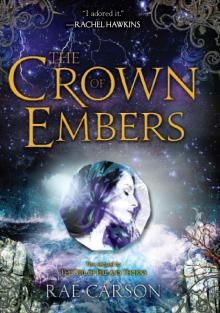 The Crown of Embers
The Crown of Embers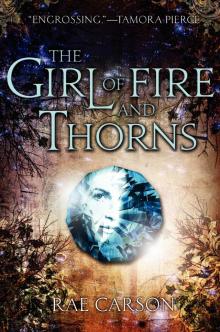 The Girl of Fire and Thorns
The Girl of Fire and Thorns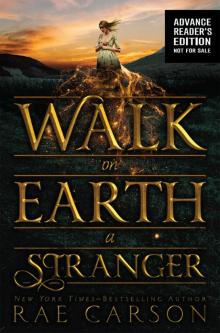 Walk on Earth a Stranger
Walk on Earth a Stranger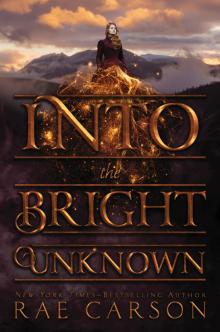 Into the Bright Unknown
Into the Bright Unknown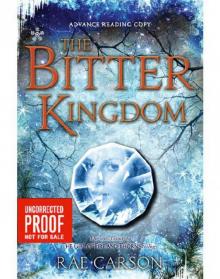 The Bitter Kingdom
The Bitter Kingdom The Rise of Skywalker
The Rise of Skywalker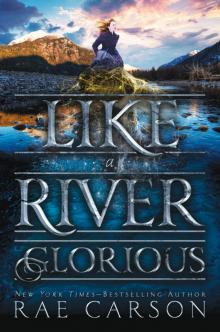 Like a River Glorious
Like a River Glorious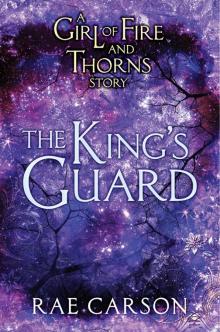 The King's Guard
The King's Guard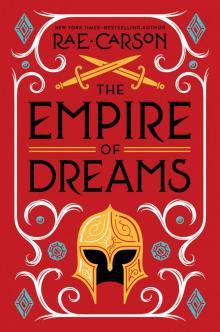 The Empire of Dreams
The Empire of Dreams Most Wanted
Most Wanted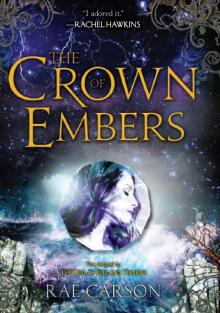 The Crown of Embers fat-2
The Crown of Embers fat-2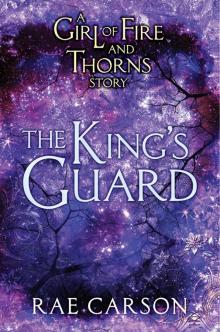 The King's Guard (fire and thorns)
The King's Guard (fire and thorns)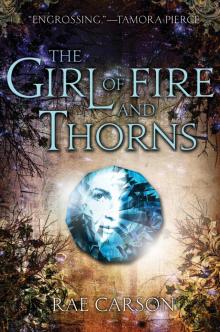 The Girl of Fire and Thorns fat-1
The Girl of Fire and Thorns fat-1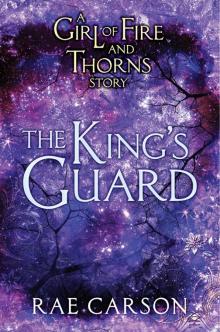 Fire and Thorns 00.7: King's Guard
Fire and Thorns 00.7: King's Guard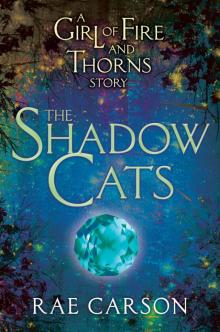 The Shadow Cats (fire and thorns )
The Shadow Cats (fire and thorns )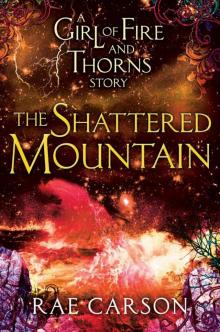 The Shattered Mountain (fire and thorns)
The Shattered Mountain (fire and thorns)